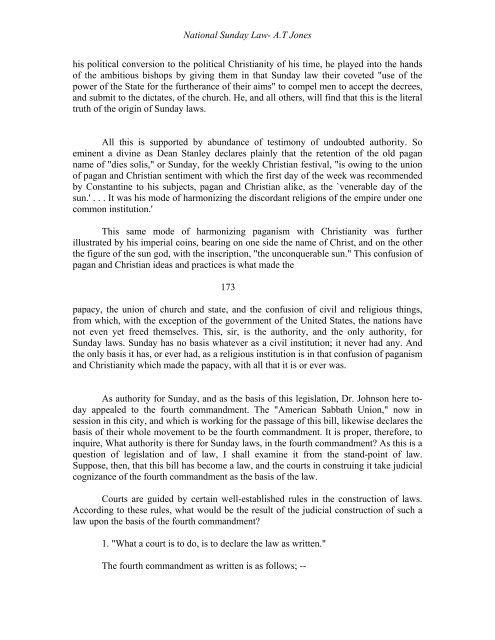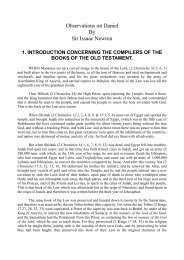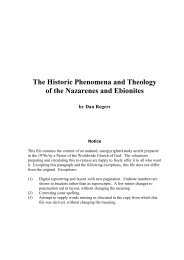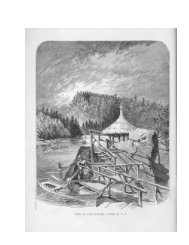THE NATIONAL SUNDAY LAW, ARGUMENT OF ALONZO T ...
THE NATIONAL SUNDAY LAW, ARGUMENT OF ALONZO T ...
THE NATIONAL SUNDAY LAW, ARGUMENT OF ALONZO T ...
You also want an ePaper? Increase the reach of your titles
YUMPU automatically turns print PDFs into web optimized ePapers that Google loves.
National Sunday Law- A.T Jones<br />
his political conversion to the political Christianity of his time, he played into the hands<br />
of the ambitious bishops by giving them in that Sunday law their coveted "use of the<br />
power of the State for the furtherance of their aims" to compel men to accept the decrees,<br />
and submit to the dictates, of the church. He, and all others, will find that this is the literal<br />
truth of the origin of Sunday laws.<br />
All this is supported by abundance of testimony of undoubted authority. So<br />
eminent a divine as Dean Stanley declares plainly that the retention of the old pagan<br />
name of "dies solis," or Sunday, for the weekly Christian festival, "is owing to the union<br />
of pagan and Christian sentiment with which the first day of the week was recommended<br />
by Constantine to his subjects, pagan and Christian alike, as the `venerable day of the<br />
sun.' . . . It was his mode of harmonizing the discordant religions of the empire under one<br />
common institution.'<br />
This same mode of harmonizing paganism with Christianity was further<br />
illustrated by his imperial coins, bearing on one side the name of Christ, and on the other<br />
the figure of the sun god, with the inscription, "the unconquerable sun." This confusion of<br />
pagan and Christian ideas and practices is what made the<br />
173<br />
papacy, the union of church and state, and the confusion of civil and religious things,<br />
from which, with the exception of the government of the United States, the nations have<br />
not even yet freed themselves. This, sir, is the authority, and the only authority, for<br />
Sunday laws. Sunday has no basis whatever as a civil institution; it never had any. And<br />
the only basis it has, or ever had, as a religious institution is in that confusion of paganism<br />
and Christianity which made the papacy, with all that it is or ever was.<br />
As authority for Sunday, and as the basis of this legislation, Dr. Johnson here today<br />
appealed to the fourth commandment. The "American Sabbath Union," now in<br />
session in this city, and which is working for the passage of this bill, likewise declares the<br />
basis of their whole movement to be the fourth commandment. It is proper, therefore, to<br />
inquire, What authority is there for Sunday laws, in the fourth commandment? As this is a<br />
question of legislation and of law, I shall examine it from the stand-point of law.<br />
Suppose, then, that this bill has become a law, and the courts in construing it take judicial<br />
cognizance of the fourth commandment as the basis of the law.<br />
Courts are guided by certain well-established rules in the construction of laws.<br />
According to these rules, what would be the result of the judicial construction of such a<br />
law upon the basis of the fourth commandment?<br />
1. "What a court is to do, is to declare the law as written."<br />
The fourth commandment as written is as follows; --
















